Dementia Researcher Blogs
The Dementia Researcher Blogs Podcasts - through this show, you can hear our bloggers read their blogs. So if you prefer to read, you can head or our website or you can listen on the move. These shows are about academic / research careers, research, science and life as an early career dementia researchers. Brought to you by https://www.dementiaresearcher.nihr.ac.uk - everything you need, all in one place. Remember to subscribe to our main ‘Dementia Researcher‘ Podcast, here and where ever you get your podcasts.
The Dementia Researcher Blogs Podcasts - through this show, you can hear our bloggers read their blogs. So if you prefer to read, you can head or our website or you can listen on the move. These shows are about academic / research careers, research, science and life as an early career dementia researchers. Brought to you by https://www.dementiaresearcher.nihr.ac.uk - everything you need, all in one place. Remember to subscribe to our main ‘Dementia Researcher‘ Podcast, here and where ever you get your podcasts.
Episodes

Tuesday May 13, 2025
Dr Emma Law - What makes a good clinical research team?
Tuesday May 13, 2025
Tuesday May 13, 2025
Dr Emma Law, narrating her blog written for the Dementia Researcher website.
In this blog, Emma Law shares her experience working with clinical research teams across Scotland. She reflects on the key qualities that make a team successful—thorough preparation, mutual respect, clear communication, and the pivotal role of the coordinator. With practical examples and real-life stories, Emma highlights the importance of acknowledging team limitations, ensuring thorough training, and maintaining humour and compassion in the face of challenges. Her insights offer a grounded look into the realities of clinical trial delivery.
Find the original text, and narration here on our website.
https://www.dementiaresearcher.nihr.ac.uk/blog-what-makes-a-good-clinical-research-team/
#DementiaResearch #ClinicalTrials #Research #TrialDelivery
--
Dr Emma Law is Strategic Manager for the The Neuroprogressive and Dementia Network in Scotland. Emma has 13 years experience as a Clinical Trails Network Manager and over 35 years experience as a Nurse, many of which were spent in the delivery of Clinical Research Trials. Emma completed her PhD and is passionate about giving people living with dementia and their carers access to participate in research.
--
Enjoy listening? We're always looking for new bloggers, drop us a line. http://www.dementiaresearcher.nihr.ac.uk
This podcast is brought to you in association with Alzheimer's Association, Alzheimer's Research UK, Alzheimer's Society and Race Against Dementia, who we thank for their ongoing support.
--
Follow us on Social Media:
https://www.instagram.com/dementia_researcher/
https://www.facebook.com/Dementia.Researcher/
https://twitter.com/demrescommunity
https://www.linkedin.com/company/dementia-researcher
https://bsky.app/profile/dementiaresearcher.bsky.social
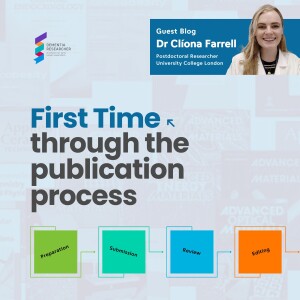
Friday May 09, 2025
Dr Clíona Farrell - First time through the publication process
Friday May 09, 2025
Friday May 09, 2025
Dr Clíona Farrell, narrating her blog written for the Dementia Researcher website.
In this blog, Clíona reflects on the step-by-step process of getting her first first-author data paper published. Drawing on a project that began during her PhD and continued into her postdoc, Clíona highlights the many layers of work involved – from early authorship discussions to final submission and revisions. Her account underscores how time-consuming, iterative, and unexpectedly complex academic publishing can be, offering an honest and practical perspective for researchers navigating their first manuscript journey.
Find the original text, and narration here on our website.
https://www.dementiaresearcher.nihr.ac.uk/blog-first-time-through-the-publication-process/
--
Dr Clíona Farrell is a Postdoctoral Researcher in the UK Dementia Research Institute at University College London. Her work focuses on understanding neuroinflammation in Down syndrome, both prior to, and in response to, Alzheimer’s disease pathology. Originally from Dublin, Ireland, Clíona completed her undergraduate degree in Neuroscience in Trinity College, and then worked as a research assistant in the Royal College of Surgeons studying ALS and Parkinson’s disease. She also knows the secret behind scopping the perfect 99 ice-cream cone. @ClionaFarrell_--
Enjoy listening? We're always looking for new bloggers, drop us a line. http://www.dementiaresearcher.nihr.ac.uk
This podcast is brought to you in association with Alzheimer's Association, Alzheimer's Research UK, Alzheimer's Society and Race Against Dementia, who we thank for their ongoing support.
--
Follow us on Social Media:
https://www.instagram.com/dementia_researcher/
https://www.facebook.com/Dementia.Researcher/
https://twitter.com/demrescommunity
https://www.linkedin.com/company/dementia-researcher
https://bsky.app/profile/dementiaresearcher.bsky.social
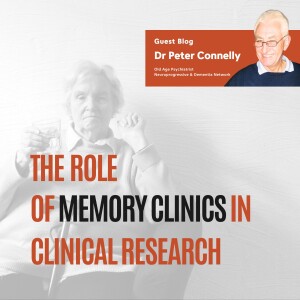
Tuesday May 06, 2025
Dr Peter Connelly - The Role of Memory Clinics in Clinical Research
Tuesday May 06, 2025
Tuesday May 06, 2025
Dr Peter Connelly narrates his blog written for Dementia Researcher.
In his first blog for Dementia Researcher, Dr Peter Connelly highlights the pivotal role memory clinics play in dementia clinical research. Despite often being perceived as distinct from everyday practice, he argues that the overlap between routine cognitive assessments and trial protocols offers an opportunity for better integration. From enhancing referrals through shared assessment tools like the MMSE to educating mainstream services, memory clinics can bridge gaps and increase trial participation. He calls for more seamless collaboration between clinical care and research, underlining the practical and strategic value of memory clinics in the clinical trial landscape.
Find the original text, and narration here on our website.
https://www.dementiaresearcher.nihr.ac.uk/blog-the-role-of-memory-clinics-in-clinical-research/
--
Dr Peter Connelly is a retired Old Age Psychiatrist who spent much of his career in Tayside, helping to establish clinical trials for dementia and neuroprogressive disorders in Scotland. Now working with the Scottish Neuroprogressive and Dementia Network, he combines professional insight with personal experience as a former carer. In retirement, he enjoys music, golf, and time with his grandchildren.
--
Enjoy listening? We're always looking for new bloggers, drop us a line. http://www.dementiaresearcher.nihr.ac.uk
This podcast is brought to you in association with Alzheimer's Association, Alzheimer's Research UK, Alzheimer's Society and Race Against Dementia, who we thank for their ongoing support.
--
Follow us on Social Media:
https://www.instagram.com/dementia_researcher/
https://www.facebook.com/Dementia.Researcher/
https://twitter.com/demrescommunity
https://www.linkedin.com/company/dementia-researcher
https://bsky.app/profile/dementiaresearcher.bsky.social
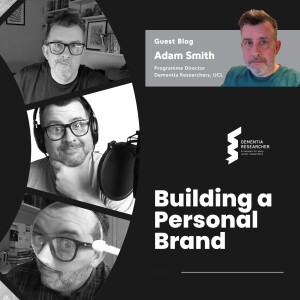
Friday May 02, 2025
Adam Smith - Building Your Personal Brand
Friday May 02, 2025
Friday May 02, 2025
Adam Smith narrates his blog written for Dementia Researcher.
In this guest blog, Adam challenges the scepticism around “personal branding” by reframing it as a tool for clarity rather than self-promotion. Drawing from personal anecdotes and practical advice, he explains how early career researchers can shape how they’re perceived by being deliberate in how they show up, online and in person. With thoughtful encouragement, he demystifies what a brand is and isn’t—and why even quiet, kind, reliable people can benefit from having one.
Find the original text, and narration here on our website.
https://www.dementiaresearcher.nihr.ac.uk/blog-building-a-personal-brand/
--
Adam Smith was born in the north, a long time ago. He wanted to write books, but ended up working in the NHS, and at the Department of Health. He is now Programme Director in the Office of the NIHR National Director for Dementia Research (which probably sounds more important than it is) at University College London. He has led a number of initiatives to improve dementia research (including this website, Join Dementia Research & ENRICH), as well as pursuing his own research interests. In his spare time, he grows vegetables, builds Lego & spends most of his time drinking too much coffee and squeezing technology into his house.
--
Enjoy listening? We're always looking for new bloggers, drop us a line. http://www.dementiaresearcher.nihr.ac.uk
This podcast is brought to you in association with Alzheimer's Association, Alzheimer's Research UK, Alzheimer's Society and Race Against Dementia, who we thank for their ongoing support.
--
Follow us on Social Media:
https://www.instagram.com/dementia_researcher/
https://www.facebook.com/Dementia.Researcher/
https://twitter.com/demrescommunity
https://www.linkedin.com/company/dementia-researcher
https://bsky.app/profile/dementiaresearcher.bsky.social
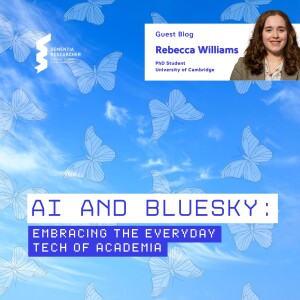
Friday May 02, 2025
Rebecca Williams - AI and BlueSky: Embracing the Everyday Tech of Academia
Friday May 02, 2025
Friday May 02, 2025
Rebecca Williams, narrates her blog written for the Dementia Researcher website.
In this blog, Rebecca offers a pragmatic guide to everyday tech that can support academic work. From AI tools like ChatGPT and Elicit, to reference managers and visual design hacks in PowerPoint, she explores how to navigate, adopt, and balance new digital tools. Rebecca also champions the use of social media platforms like BlueSky to connect and amplify research, encouraging researchers to make technology work for them—efficiently, thoughtfully, and creatively.Find the original text, and narration here on our website.https://www.dementiaresearcher.nihr.ac.uk/blog-ai-and-bluesky-embracing-the-everyday-tech-of-academia/--
Rebecca Williams is PhD student at the University of Cambridge. Though originally from ‘up North’ in a small town called Leigh, she did her undergraduate and masters at the University of Oxford before defecting to Cambridge for her doctorate researching Frontotemporal dementia and Apathy. She now spends her days collecting data from wonderful volunteers, and coding. Outside work, she plays board games, and is very crafty. @beccasue99
--
Enjoy listening? We're always looking for new bloggers, drop us a line. http://www.dementiaresearcher.nihr.ac.uk
This podcast is brought to you in association with Alzheimer's Association, Alzheimer's Research UK, Alzheimer's Society and Race Against Dementia, who we thank for their ongoing support.
--
Follow us on Social Media:
https://www.instagram.com/dementia_researcher/
https://www.facebook.com/Dementia.Researcher/
https://twitter.com/demrescommunity
https://www.linkedin.com/company/dementia-researcher
https://bsky.app/profile/dementiaresearcher.bsky.social
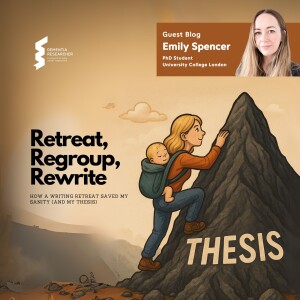
Saturday Apr 26, 2025
Emily Spencer - Retreat, Regroup, Rewrite
Saturday Apr 26, 2025
Saturday Apr 26, 2025
Emily Spencer, narrating her blog written for the Dementia Researcher website.
In her new blog, Emily shares how a writing retreat provided a vital lifeline during a difficult time balancing research and parenting. Amid exhaustion, doubts, and a heavy workload, Emily found renewed confidence, rest, and extraordinary productivity during three days of silent writing. Her honest reflection highlights the value of protected time and reminds us that even small breaks can restore belief in ourselves and our work.
Find the original text, and narration here on our website.
https://www.dementiaresearcher.nihr.ac.uk/blog-retreat-regroup-rewrite/
#DementiaResearch #AcademicMother #Academia #MaternityLeave #Research #Productivity #PhDWriting #PhDLife
--
Emily Spencer is a PhD Student at University College London looking at improving how GPs communicate with people with dementia and their family carers about their future care. Emily previous had a 5 year career break to pursue a career as a musician, and has previously undertaken research on improving the care people with dementia receive from their GP practice, as well as end-of-life and palliative care provision in the community. Emily is also a new mum and will be writing about her experiences navigating motherhood and a research career.
--
Enjoy listening? We're always looking for new bloggers, drop us a line. http://www.dementiaresearcher.nihr.ac.uk
This podcast is brought to you in association with Alzheimer's Association, Alzheimer's Research UK, Alzheimer's Society and Race Against Dementia, who we thank for their ongoing support.
--
Follow us on Social Media:
https://www.instagram.com/dementia_researcher/
https://www.facebook.com/Dementia.Researcher/
https://x.com/demrescommunity
https://bsky.app/profile/dementiaresearcher.bsky.social
https://www.linkedin.com/company/dementia-researcher

Friday Apr 25, 2025
Adam Smith - How to Network and Advice for Making the First Move
Friday Apr 25, 2025
Friday Apr 25, 2025
Adam Smith narrates his blog written for Dementia Researcher.
In this blog, Adam shares practical and honest advice on networking in research. Drawing on personal experiences and real-life examples, he breaks down the awkwardness of making the first move, highlights the power of casual conversations, and encourages early-career researchers to embrace small, meaningful interactions. His message is simple but powerful: connection matters, even if it starts with just a like, a question, or a compliment.
Find the original text, and narration here on our website.
https://www.dementiaresearcher.nihr.ac.uk/blog-how-to-network-and-advice-for-making-the-first-move/
--
Adam Smith was born in the north, a long time ago. He wanted to write books, but ended up working in the NHS, and at the Department of Health. He is now Programme Director in the Office of the NIHR National Director for Dementia Research (which probably sounds more important than it is) at University College London. He has led a number of initiatives to improve dementia research (including this website, Join Dementia Research & ENRICH), as well as pursuing his own research interests. In his spare time, he grows vegetables, builds Lego & spends most of his time drinking too much coffee and squeezing technology into his house.
--
Enjoy listening? We're always looking for new bloggers, drop us a line. http://www.dementiaresearcher.nihr.ac.uk
This podcast is brought to you in association with Alzheimer's Association, Alzheimer's Research UK, Alzheimer's Society and Race Against Dementia, who we thank for their ongoing support.
--
Follow us on Social Media:
https://www.instagram.com/dementia_researcher/
https://www.facebook.com/Dementia.Researcher/
https://twitter.com/demrescommunity
https://www.linkedin.com/company/dementia-researcher
https://bsky.app/profile/dementiaresearcher.bsky.social

Wednesday Apr 23, 2025
Jacqui Kerr - A Day in the Life of a Clinical Trial Coordinator
Wednesday Apr 23, 2025
Wednesday Apr 23, 2025
Jacqui Kerr narrates her blog written for Dementia Researcher.
In her first guest blog, Jacqui Kerr from the Neuroprogressive & Dementia Network offers a personal and insightful glimpse into her role as a clinical trial coordinator. With nearly two decades in Alzheimer’s research, Jacqui reflects on the complexity and rewards of her work, highlighting the critical importance of communication, teamwork, and participant engagement. From coordinating diverse professionals to supporting study volunteers, she reveals the dynamic nature of a role often underestimated but essential to successful research.
Find the original text, and narration here on our website.
https://www.dementiaresearcher.nihr.ac.uk/blog-a-day-in-the-life-of-a-clinical-trial-coordinator/
--
Jacqueline Kerr is the Network Manager for the Neuroprogressive and Dementia Network in Scotland. With a background in research management and public engagement, she is dedicated to supporting clinical trials and improving access to research across the country. Jacqueline works closely with clinicians, researchers, and the public to raise awareness of dementia studies and encourage participation.
--
Enjoy listening? We're always looking for new bloggers, drop us a line. http://www.dementiaresearcher.nihr.ac.uk
This podcast is brought to you in association with Alzheimer's Association, Alzheimer's Research UK, Alzheimer's Society and Race Against Dementia, who we thank for their ongoing support.
--
Follow us on Social Media:
https://www.instagram.com/dementia_researcher/
https://www.facebook.com/Dementia.Researcher/
https://x.com/demrescommunity
https://bsky.app/profile/dementiaresearcher.bsky.social
https://www.linkedin.com/company/dementia-researcher

Sunday Apr 20, 2025
Sunday Apr 20, 2025
Jennifer Bray narrates her & Dr Teresa Atkinson's blog written for Dementia Researcher.
Jennifer & Teresa reflect on the unexpected hurdles they faced while evaluating a new staff role in a housing scheme. From construction delays and staff resignations to illness and data collection issues, their blog highlights the reality of conducting research in real-world settings. They share how flexibility, preparation, good communication, and strong relationships helped them overcome setbacks and still deliver a successful project—packed with valuable insights for fellow researchers.
Find the original text, and narration here on our website.
https://www.dementiaresearcher.nihr.ac.uk/blog-reflecting-on-challenging-situations-when-conducting-research/
--
Jennifer Bray is a Research Assistant at the University of Worcester’s Association for Dementia Studies. Her work focuses on improving quality of life for people affected by dementia, with recent projects on environmental design and carer support.
Dr Teresa Atkinson is a Senior Research Fellow at the University of Worcester’s Association for Dementia Studies. Her work focuses on improving quality of life for people living with dementia and those who support them, drawing on over 20 years of qualitative research experience.
--
Enjoy listening? We're always looking for new bloggers, drop us a line. http://www.dementiaresearcher.nihr.ac.uk
This podcast is brought to you in association with Alzheimer's Association, Alzheimer's Research UK, Alzheimer's Society and Race Against Dementia, who we thank for their ongoing support.
--
Follow us on Social Media:
https://www.instagram.com/dementia_researcher/
https://www.facebook.com/Dementia.Researcher/
https://x.com/demrescommunity
https://bsky.app/profile/dementiaresearcher.bsky.social
https://www.linkedin.com/company/dementia-researcher





